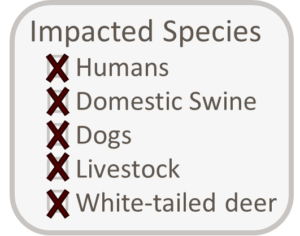 Leptospirosis is a disease caused by the spiral-shaped bacteria Leptospira interrogans. There are over 300 strains of leptospirosis, with specific strains adapted to specific animals and regions. In domestic pigs, symptoms can include poor conception, abortions, weakness, and jaundice, but mortalities rarely occur. In an infected animal, the leptospirosis bacteria can be found in the kidney where it replicates and is shed in the urine. Transmission typically occurs through contact with infected urine, but the bacteria can also persist in the environment under favorable conditions such as slow-moving water, stagnant water, or in very moist soil. Transmission can also occur through consumption of infected water, or contact of infected water with cuts, abrasions, or mucous membranes. Modern husbandry practices have greatly reduced the impacts of leptospirosis on domestic operations in the United States. However, testing of feral swine has found antibodies indicating the presence of the bacteria across their range in the United States and in many other places around the world.
Leptospirosis is a disease caused by the spiral-shaped bacteria Leptospira interrogans. There are over 300 strains of leptospirosis, with specific strains adapted to specific animals and regions. In domestic pigs, symptoms can include poor conception, abortions, weakness, and jaundice, but mortalities rarely occur. In an infected animal, the leptospirosis bacteria can be found in the kidney where it replicates and is shed in the urine. Transmission typically occurs through contact with infected urine, but the bacteria can also persist in the environment under favorable conditions such as slow-moving water, stagnant water, or in very moist soil. Transmission can also occur through consumption of infected water, or contact of infected water with cuts, abrasions, or mucous membranes. Modern husbandry practices have greatly reduced the impacts of leptospirosis on domestic operations in the United States. However, testing of feral swine has found antibodies indicating the presence of the bacteria across their range in the United States and in many other places around the world.
Leptospirosis is zoonotic and can be transmitted to dogs, horses, cattle, sheep, goats, and humans. In humans, leptospirosis can be treated with antibiotics which are most effective when started early in the infection. Symptoms may include fever, chills, jaundice, vomiting, and muscle aches. In more severe cases, leptospirosis is sometimes referred to as Weil’s disease and can cause kidney disease and pulmonary hemorrhage. People who come into contact with animal urine due to occupation or unsanitary condition are at higher risk of contracting the disease. Caution should also be used in recreational activities involving water or mud that may contain animal urine.